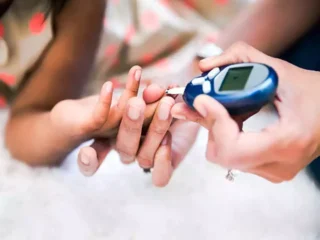New Delhi, 13 October, 2025: Diabetes mellitus is one of the fastest-growing health challenges worldwide, affecting hundreds of millions of people across all age groups. What makes it particularly concerning is that many individuals have diabetes for months or even years before it is diagnosed. Early detection is critical — not only can it help prevent complications, but it can also improve quality of life and long-term health outcomes.
Diabetes occurs when the body either doesn’t produce enough insulin or can’t use it effectively. Insulin is a hormone that helps regulate blood sugar levels. When this balance is disrupted, glucose builds up in the blood, leading to serious health problems over time, including heart disease, nerve damage, vision loss, kidney disease, and more.
The good news is that diabetes often gives early warning signs — signals your body sends to alert you that something isn’t right. Recognizing these signs and seeking medical attention early can make a huge difference. Here are the top 7 early warning signs of diabetes that should never be ignored.
1. Excessive Thirst and Frequent Urination
One of the earliest and most common signs of diabetes is unusual thirst and the need to urinate frequently. This happens because excess sugar builds up in your bloodstream, forcing your kidneys to work overtime to filter and absorb it. When your kidneys can’t keep up, the extra sugar is flushed out in your urine — dragging fluids from your tissues along with it.
As a result:
- You may feel dehydrated no matter how much water you drink.
- You may need to urinate more often, especially at night.
- Your mouth may often feel dry.
Why it matters: Chronic dehydration and frequent urination can affect your daily life and are often the first signs people notice. If this persists for more than a few days, it’s important to get your blood sugar checked.
2. Unexplained Weight Loss
Unexpected weight loss without changing your diet or exercise routine can also be a red flag. When your body can’t properly use glucose for energy, it starts breaking down muscle and fat for fuel. This can lead to noticeable weight loss over a short period of time.
You may also experience:
- A drop in body weight despite eating normally or more than usual.
- Loss of muscle tone and strength.
- Fatigue, as your body isn’t efficiently converting food into energy.
Why it matters: Many people dismiss weight loss as a positive sign, but sudden, unexplained weight loss can be one of the earliest signs of both type 1 diabetes and type 2 diabetes. This should never be ignored, especially if accompanied by other symptoms.
3. Extreme Hunger and Fatigue
Even though your blood sugar levels may be high, the cells in your body aren’t able to use that glucose effectively. This results in a lack of energy, which can leave you feeling tired, weak, and hungry all the time.
You might notice:
- Increased hunger shortly after eating.
- Difficulty concentrating or staying awake.
- Fatigue even after getting enough sleep.
Why it matters: This feeling of “running on empty” is common in early diabetes. Persistent fatigue that isn’t resolved by rest or food may warrant medical evaluation.
4. Blurred Vision
High blood sugar levels can cause the lens of the eye to swell, affecting your ability to focus. Many people with undiagnosed diabetes notice blurred or fluctuating vision as one of the first symptoms.
This can appear as:
- Blurriness in one or both eyes.
- Difficulty focusing on near or distant objects.
- Vision changes that come and go.
Why it matters: Left unchecked, uncontrolled diabetes can lead to diabetic retinopathy, a leading cause of blindness. Early detection and blood sugar management can prevent or delay vision damage.
5. Slow Healing of Wounds and Frequent Infections
High blood sugar levels affect your body’s ability to heal and fight infections. Over time, it can damage blood vessels, reduce circulation, and weaken the immune system.
People with early or undiagnosed diabetes may notice:
- Cuts and bruises that take longer than usual to heal.
- Recurrent infections, especially skin, urinary tract, or gum infections.
- Persistent inflammation around wounds.
Why it matters: Slow healing is a major warning sign of diabetes and, if left untreated, can lead to complications like ulcers and infections that require medical intervention.
6. Tingling, Numbness, or Pain in Hands and Feet
High blood sugar can damage nerves — a condition known as diabetic neuropathy. While this typically develops over time, some people experience tingling, burning, or numbness in their hands and feet early in the disease.
You might feel:
- A “pins and needles” sensation in fingers or toes.
- Occasional burning or aching pain.
- Reduced sensitivity in extremities.
Why it matters: Early neuropathy can often be reversed or managed if blood sugar levels are brought under control. Ignoring it can lead to permanent nerve damage.
7. Dark Patches on the Skin (Acanthosis Nigricans)
Another subtle but important early sign of diabetes is the appearance of dark, velvety patches on the skin, especially around the neck, armpits, elbows, or groin. This condition is called acanthosis nigricans and is often associated with insulin resistance, a major risk factor for type 2 diabetes.
You may notice:
- Thickened skin with a darker tone.
- Itchiness or discomfort in affected areas.
- Gradual spreading of the patches over time.
Why it matters: This sign is especially common in people who are overweight or have a family history of diabetes. It’s a physical clue that your body may be struggling with insulin sensitivity.
Why Early Detection Matters
Catching diabetes early can help prevent or delay many of its most serious complications. Untreated or poorly managed diabetes can damage the heart, kidneys, nerves, eyes, and more. However, when detected early, lifestyle changes and proper treatment can help keep blood sugar levels under control and significantly reduce the risk of long-term harm.
Some of the potential complications of undiagnosed or unmanaged diabetes include:
- diabetic nephropathy (kidney disease)
- Heart disease and stroke
- Vision loss due to diabetic eye disease
- Nerve damage and circulation problems
- Increased risk of infections and delayed wound healing
Who Is at Risk?
While diabetes can affect anyone, certain factors increase your risk:
- A family history of diabetes
- Being overweight or obese
- Sedentary lifestyle
- High blood pressure or cholesterol levels
- History of gestational diabetes or polycystic ovary syndrome
- Age over 40 (though more young adults and teens are being diagnosed now)
Even if you don’t have these risk factors, it’s important to pay attention to your body and get checked if you experience any warning signs.
What to Do if You Notice the Signs
If you recognize any of these early warning signs in yourself or someone else, don’t ignore them. Diabetes is a manageable condition, but early action is key. Here are some steps to take:
- Schedule a blood sugar test: A simple blood test can confirm whether your glucose levels are in the normal range.
- Consult a healthcare professional: If your results are abnormal, your doctor may order additional tests to diagnose the type and stage of diabetes.
- Adopt lifestyle changes: Healthy eating, regular physical activity, and weight management can help control blood sugar levels.
- Follow medical advice: Depending on the diagnosis, medication or insulin therapy may be prescribed.
- Monitor regularly: Routine monitoring helps keep blood sugar levels in check and prevents complications.
Prevention Is Powerful
While some cases of diabetes are genetic, many can be prevented or delayed through lifestyle choices. Key preventive steps include:
- Maintaining a healthy weight
- Exercising at least 30 minutes a day
- Eating a balanced diet low in processed sugar and refined carbs
- Managing stress and getting enough sleep
- Getting regular checkups, especially if you’re at risk
By staying alert to the early signs and making proactive choices, you can protect your health and reduce your risk of serious complications.
Diabetes doesn’t develop overnight — and your body often gives clear signals before the disease fully takes hold. Excessive thirst, frequent urination, unexplained weight loss, fatigue, blurred vision, slow healing, tingling, and dark skin patches are all signs that shouldn’t be ignored.
Early detection, lifestyle changes, and proper medical care can change the course of the disease and help you lead a healthy, active life. If you experience any of these warning signs, talk to a healthcare professional right away. Your future health may depend on it.






